Exploring Qi Energy Flow and Balance in Everyday Life
Posted by Jemile Nesimi Hobson, B.A. on Dec 18, 2024
What if your body had a subtle yet powerful energy system guiding your physical, emotional, and mental well-being? In Traditional Chinese Medicine (TCM), this concept is known as Qi (pronounced “chee”)—the vital life force that flows through us all. Understanding Qi energy flow and learning to balance it can unlock a more harmonious, health-centered lifestyle.
Whether new to holistic wellness or seeking to deepen your practice, exploring Qi offers valuable tools for improving energy, managing stress, and achieving sustainable health. Understanding what Qi is, how it impacts your daily life, and actionable steps you can take to nurture its flow will help you make the right choices to improve your everyday life!
What Is Qi?
Qi is a foundational concept in Traditional Chinese Medicine (TCM), often described as the vital life force or energy that sustains all living beings. Qi is believed to animate the body, govern its processes, and maintain physical, emotional, and spiritual harmony.
In TCM philosophy, Qi is not limited to the body—it also exists in nature, flowing through the environment and connecting all forms of life. This universal energy reflects balance, change, and interdependence, aligning with the natural world's rhythms.
Key Aspects of Qi:
- Life Force: Qi is the essence that powers physical vitality and health, akin to the “spark” of life.
- Dynamic Movement: It flows continuously, driving the body’s physiological functions and adapting to internal and external changes.
- Holistic Influence: Qi supports physical well-being, emotional resilience, and mental clarity.
While there is no direct Western equivalent, Qi parallels concepts such as "prana" in Ayurveda or "life energy" in various holistic traditions. It underscores the interconnectedness of mind, body, and environment, making it central to achieving holistic health and balance.
Understanding Qi is the first step toward integrating TCM principles into daily life to optimize overall well-being and have the vital life you deserve.

Qi Energy Flow: The Pathways of Vitality
In Traditional Chinese Medicine (TCM), Qi energy flows through an intricate network of channels in the body called meridians. These meridians act as pathways that connect vital organs, glands, and systems, ensuring the smooth movement of energy needed to maintain health and harmony.
Key Functions of Qi in the Body
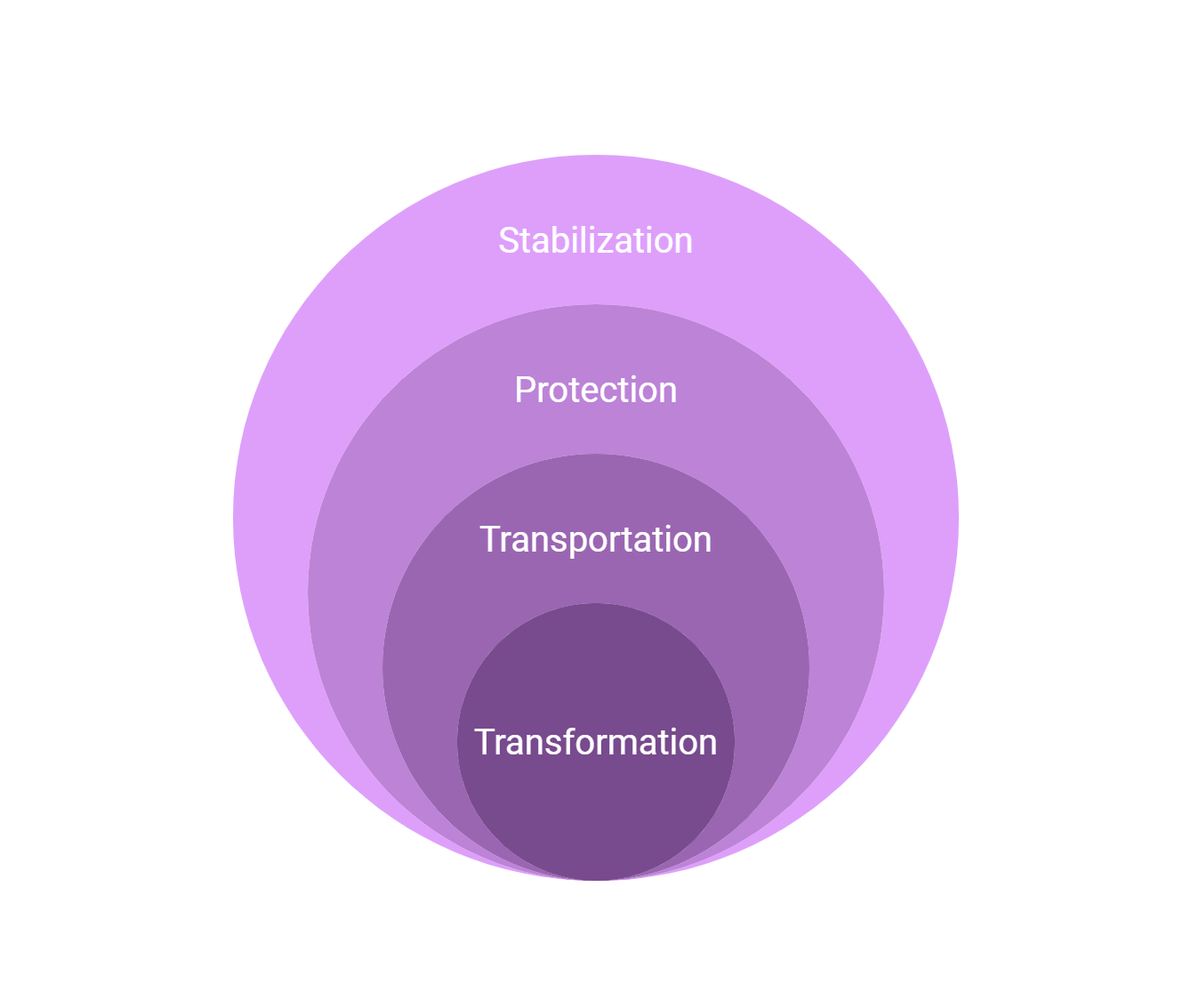
- Transportation: Qi moves essential substances like blood and nutrients through the body.
- Protection: Qi safeguards against illness by supporting immunity.
- Transformation: Qi drives metabolism and the conversion of food into energy.
- Stabilization: Qi regulates temperature, emotional balance, and bodily processes.
How Does Qi Energy Flow?
Qi travels continuously along the meridians, nourishing organs, tissues, and cells. Each organ system has associated meridians that regulate its energy and function. For example, the Lung Meridian influences respiration and immunity, while the Stomach Meridian supports digestion and nutrient absorption.
This flow isn’t random—it follows specific circuits that synchronize the body’s internal rhythms with the natural cycles of day, night, and seasons. This alignment is key to balancing energy and achieving optimal well-being.
The Role of Meridians in Health
Meridians function as the body’s energy highways, facilitating communication between systems. When Qi flows freely, the body operates efficiently, and you experience:
- Physical Vitality: Energy and strength to power through daily tasks.
- Emotional Balance: Resilience against stress and negative emotions.
- Mental Clarity: Enhanced focus and decision-making.
However, disruptions in Qi flow can cause stagnation (blocked energy) or depletion (low energy), which may manifest as physical discomfort, emotional distress, or illness.
What is Qi Deficiency?
Qi deficiency occurs when the body’s energy stores are too low to support optimal functioning. It can result from lifestyle choices, emotional states, or environmental factors that gradually drain energy reserves.
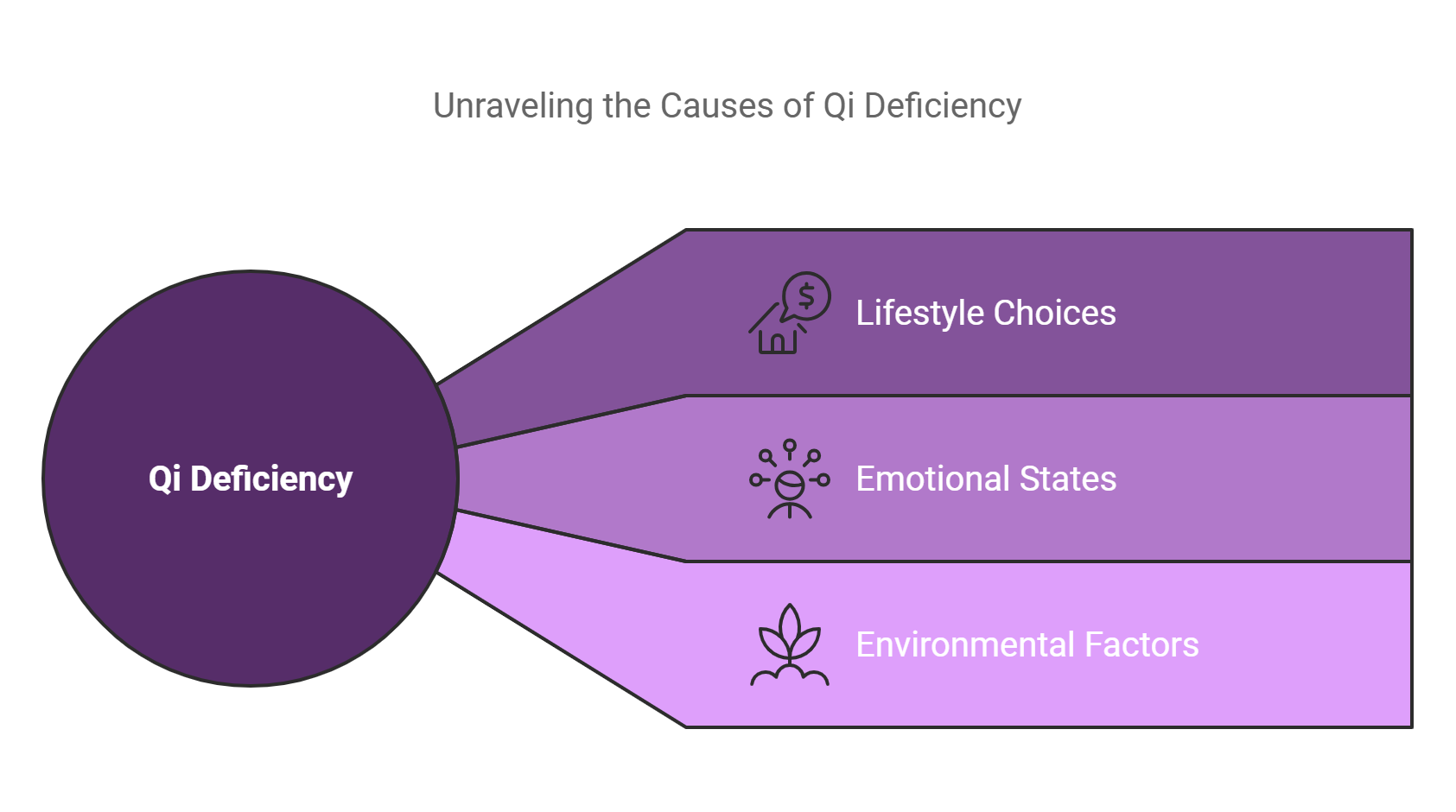
Common Causes of Qi Deficiency
- Poor Nutrition
Diets low in nutrient-dense foods fail to provide the energy needed to sustain Qi. Highly processed or cold foods like ice cream or sugary snacks may further weaken digestive energy. - Overwork or Lack of Rest
Chronic stress and insufficient sleep tax the body’s energy, leaving it unable to recharge. Constantly pushing through exhaustion depletes Qi over time. - Emotional Strain
Prolonged periods of worry, sadness, or grief can drain the body’s energy, particularly in the Spleen and Lung Meridians. Emotional imbalances often correlate with physical depletion. - Environmental Factors
Exposure to environmental toxins, pollutants, or extreme weather conditions can disrupt natural energy flow, weakening the body’s ability to maintain balance.
Signs of Qi Energy Flow Imbalance
When Qi energy becomes blocked or depleted, the body signals this disruption through various symptoms. Recognizing these early warning signs can help you take proactive steps to restore balance.
Physical Symptoms
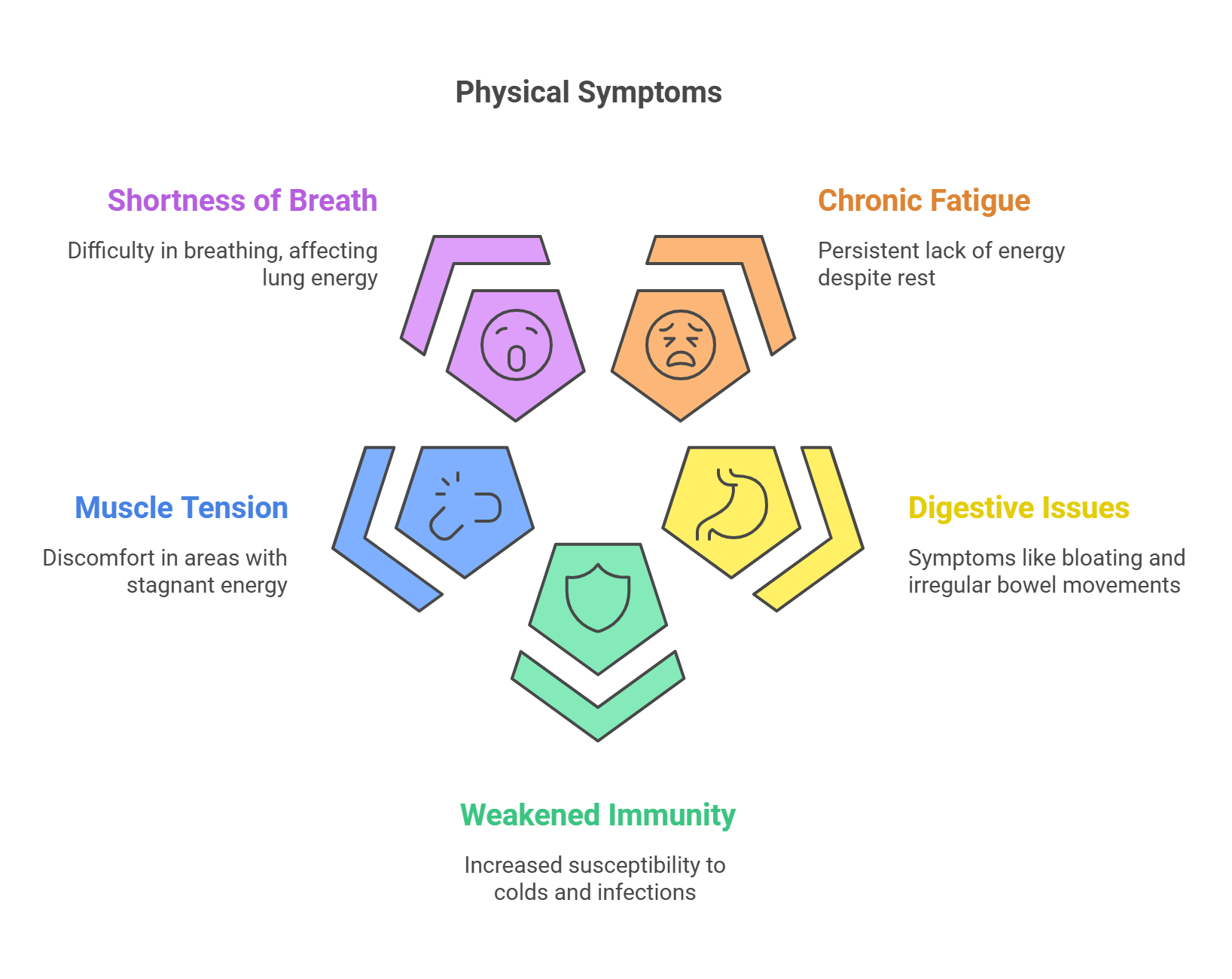
- Chronic Fatigue: A persistent lack of energy, even after rest.
- Digestive Issues: Bloating, poor appetite, or irregular bowel movements.
- Frequent Colds or Infections: Weakened immunity due to diminished protective Qi.
- Muscle Tension or Pain: Discomfort often localized in areas where Qi is stagnant.
- Shortness of Breath: Difficulty catching your breath, signaling disrupted Lung Meridian energy.
Emotional Symptoms
- Irritability or Frustration: Often linked to Qi stagnation in the liver, which governs emotional flow.
- Anxiety or Restlessness: Disrupted Heart Meridian energy may lead to feelings of unease.
- Feeling "Stuck" Emotionally: Difficulty processing or releasing emotions, a sign of blocked Qi.
Behavioral Patterns
- Difficulty Focusing: Mental fog or an inability to concentrate.
- Lack of Motivation: A sense of inertia or struggling to complete tasks.
- Overwhelm: Feeling burdened by everyday responsibilities.
Solutions for Qi Deficiency
Restoring and maintaining balanced Qi requires a multi-faceted approach that includes lifestyle adjustments, therapeutic practices, and mindfulness techniques. By nurturing your body and mind, you can enhance the flow of Qi, replenishing energy and supporting overall harmony.
Adopt a Nutrient-Rich Diet
Proper nutrition is foundational for replenishing Qi. Focus on warming, easily digestible, and energy-nourishing foods to support your body’s internal balance.
Foods That Boost Qi:
- Whole Grains: Brown rice, quinoa, and oats provide sustained energy.
- Root Vegetables: Sweet potatoes, carrots, and beets nourish the digestive system.
- Proteins: Eggs, tofu, and lentils strengthen and restore energy.
- Herbs and Spices: Ginger, turmeric, and cinnamon stimulate digestion and Qi circulation.
Avoid:
- Overly processed, sugary, or cold foods that can stagnate Qi flow.
Prioritize Rest and Stress Management
Stress and overwork are among the most common causes of Qi depletion. Incorporate restful practices into your routine to allow your body to recharge.
- Sleep Hygiene: Aim for 7–9 hours of restful sleep each night. One of the most important parts of sleep hygiene is having a regular bedtime daily, including weekends. This daily routine keeps the circadian rhythm operating healthily. A calming bedtime ritual, such as herbal tea or meditation, can help prepare your body for restorative rest.
- Daily Breaks: Schedule moments of rest throughout your day to prevent mental and physical exhaustion.
- Mindfulness Practices: Engage in meditation or deep-breathing exercises to center your mind and restore balance. An example would be to practice a 5-10 minute deep-breathing exercise, such as box breathing (inhale for 4 seconds, hold for 4 seconds, exhale for 4 seconds). For a reminder of the importance of meditation, please see our article on meditation for well-being.
Seek Acupuncture or Acupressure
Acupuncture is a cornerstone of TCM for restoring Qi flow. By stimulating specific meridian points, it unblocks pathways and replenishes energy reserves.
For a DIY approach, acupressure can be practiced at home:
- ST36 (Zu San Li): Located below the kneecap, this point boosts energy and digestion.
- LI4 (He Gu): Found between the thumb and index finger, this point relieves stress and tension.
Here is a more detailed article on Acupuncture if you want to learn more about this important component of TCM.
Incorporate Herbal Remedies
Herbal remedies play a vital role in Traditional Chinese Medicine (TCM) for restoring Qi, addressing deficiencies, and enhancing overall vitality. Below is a curated list of popular herbal options for Qi restoration. Each remedy offers unique benefits, targeting specific areas of imbalance to help improve immunity, digestion, and energy.
Astragalus 10+
 Astragalus 10+ is renowned for its ability to enhance immune function. This formula strengthens the body’s defenses against illness, making it especially beneficial for those prone to frequent colds or infections. It is a powerful ally in bolstering your body’s natural protective Qi.
Astragalus 10+ is renowned for its ability to enhance immune function. This formula strengthens the body’s defenses against illness, making it especially beneficial for those prone to frequent colds or infections. It is a powerful ally in bolstering your body’s natural protective Qi.
Ginseng 6
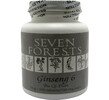 This formula focuses on restoring body fluids while boosting vitality and mental clarity. Ginseng 6 is ideal for individuals with fatigue, thirst, low energy, and mental fog, providing the nourishment needed to reinvigorate depleted Qi reserves.
This formula focuses on restoring body fluids while boosting vitality and mental clarity. Ginseng 6 is ideal for individuals with fatigue, thirst, low energy, and mental fog, providing the nourishment needed to reinvigorate depleted Qi reserves.
Gui Pi Wan
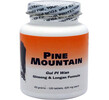 Gui Pi Wan nourishes the blood while strengthening the heart and spleen. It is particularly useful for addressing fatigue, anxiety, weak digestion, and insomnia, especially when caused by blood and Qi deficiency. This remedy promotes a sense of calm and sustained energy.
Gui Pi Wan nourishes the blood while strengthening the heart and spleen. It is particularly useful for addressing fatigue, anxiety, weak digestion, and insomnia, especially when caused by blood and Qi deficiency. This remedy promotes a sense of calm and sustained energy.
Jade Screen Tablets
 Jade Screen Tablets work to tonify Wei Qi, or defensive energy, protecting the body from external pathogens. This formula is commonly used to strengthen immunity and prevent seasonal illnesses, supporting those in environments with high exposure to germs.
Jade Screen Tablets work to tonify Wei Qi, or defensive energy, protecting the body from external pathogens. This formula is commonly used to strengthen immunity and prevent seasonal illnesses, supporting those in environments with high exposure to germs.
Lotus 9
 Lotus 9 helps dry dampness and supports digestive health, making it an effective solution for individuals experiencing bloating or sluggish digestion. This formula restores smooth energy flow and combats Qi stagnation in the digestive system by addressing dampness.
Lotus 9 helps dry dampness and supports digestive health, making it an effective solution for individuals experiencing bloating or sluggish digestion. This formula restores smooth energy flow and combats Qi stagnation in the digestive system by addressing dampness.
Atractylodes Tablets
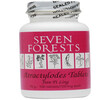 Atractylode tablets regulate the intestines, regulate spleen function, and support digestion. This formula is a go-to for addressing irregular bowel movements or weak digestive Qi, which is essential for improving gut health and nutrient absorption.
Atractylode tablets regulate the intestines, regulate spleen function, and support digestion. This formula is a go-to for addressing irregular bowel movements or weak digestive Qi, which is essential for improving gut health and nutrient absorption.
Astragalus 16
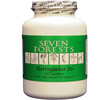 Astragalus 16 combines immune-boosting properties with the ability to clear heat, helping replenish Qi while combating fatigue and heat-related conditions. It provides a balanced approach to energy restoration and immune regulation.
Astragalus 16 combines immune-boosting properties with the ability to clear heat, helping replenish Qi while combating fatigue and heat-related conditions. It provides a balanced approach to energy restoration and immune regulation.
Bu Zhong Yi Qi Wan
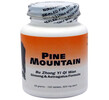 Bu Zhong Yi Qi Wan focuses on raising Qi and strengthening the middle burner, which includes the spleen and stomach. It is particularly effective for those recovering from illness or dealing with low energy levels caused by weak digestion.
Bu Zhong Yi Qi Wan focuses on raising Qi and strengthening the middle burner, which includes the spleen and stomach. It is particularly effective for those recovering from illness or dealing with low energy levels caused by weak digestion.
Xiang Sha Jun Zi Wan
 Xiang Sha Jun Zi Wan improves spleen Qi deficiency and alleviates digestive discomfort such as bloating, nausea, or loss of appetite. It supports the digestive system, enabling smoother energy flow and improved vitality.
Xiang Sha Jun Zi Wan improves spleen Qi deficiency and alleviates digestive discomfort such as bloating, nausea, or loss of appetite. It supports the digestive system, enabling smoother energy flow and improved vitality.
We also have more information on Herbs to Balance Qi that we discussed previously.
Additional Ways to Improve Qi Energy Flow and Balance
Improving Qi energy flow and maintaining balance involves integrating mindful practices and lifestyle adjustments into your daily routine.
Practice Breathwork and Movement
Breathing exercises and gentle movement can significantly enhance Qi circulation and promote overall well-being. Meditative practices like Tai Chi and Qigong use slow, deliberate movements combined with controlled breathing to align the body’s energy, harmonizing physical and mental health. Another effective method is abdominal breathing, or Dan Tian breathing, which grounds the mind while encouraging a smooth, continuous Qi flow throughout the body.

Engage in Gentle Physical Activities
Light physical activity is key to stimulating Qi without overexerting yourself. Walking, yoga, and stretching exercises improve energy circulation, and help release blockages along the meridians. A 10-minute morning yoga routine can activate Qi and provide a vibrant start to your day. Similarly, taking mindful walks in nature allows you to connect with fresh energy from your surroundings, enhancing your vitality.
Cultivate Emotional Balance
Emotions can have a profound impact on Qi flow. Stagnation often arises from unprocessed feelings, making emotional health a crucial element of energy balance. Journaling your thoughts is a helpful way to release built-up tension, while a gratitude practice fosters a positive mental state and smoother energy flow. Therapeutic conversations with a trusted friend or therapist can help resolve unresolved emotions, promoting emotional clarity and Qi harmony.
Harmonize Your Environment
The environment you inhabit directly influences the flow of Qi in your life. Creating a balanced, calming space helps support relaxation and energy flow. Start by decluttering, as a tidy and organized space encourages free movement of energy. Incorporate natural elements like plants, soft lighting, and soothing colors to create an inviting and harmonious atmosphere. Aromatherapy with essential oils such as lavender or eucalyptus can also enhance relaxation and restore Qi balance.
Understanding and nurturing your Qi energy can unlock a deeper connection to your physical, emotional, and mental well-being. Whether through mindful breathing, incorporating nutrient-rich foods and herbal remedies, or creating a harmonious living space, each step contributes to restoring balance and vitality. Traditional Chinese Medicine offers practical, time-tested tools to enhance Qi energy flow and maintain harmony in modern life. Start with small, intentional changes today, and experience how cultivating Qi can transform your health and bring balance to your everyday life.
At AcuAtlanta.net, we’re here to support your wellness journey with premium herbal solutions and guidance to help you achieve lasting vitality.











